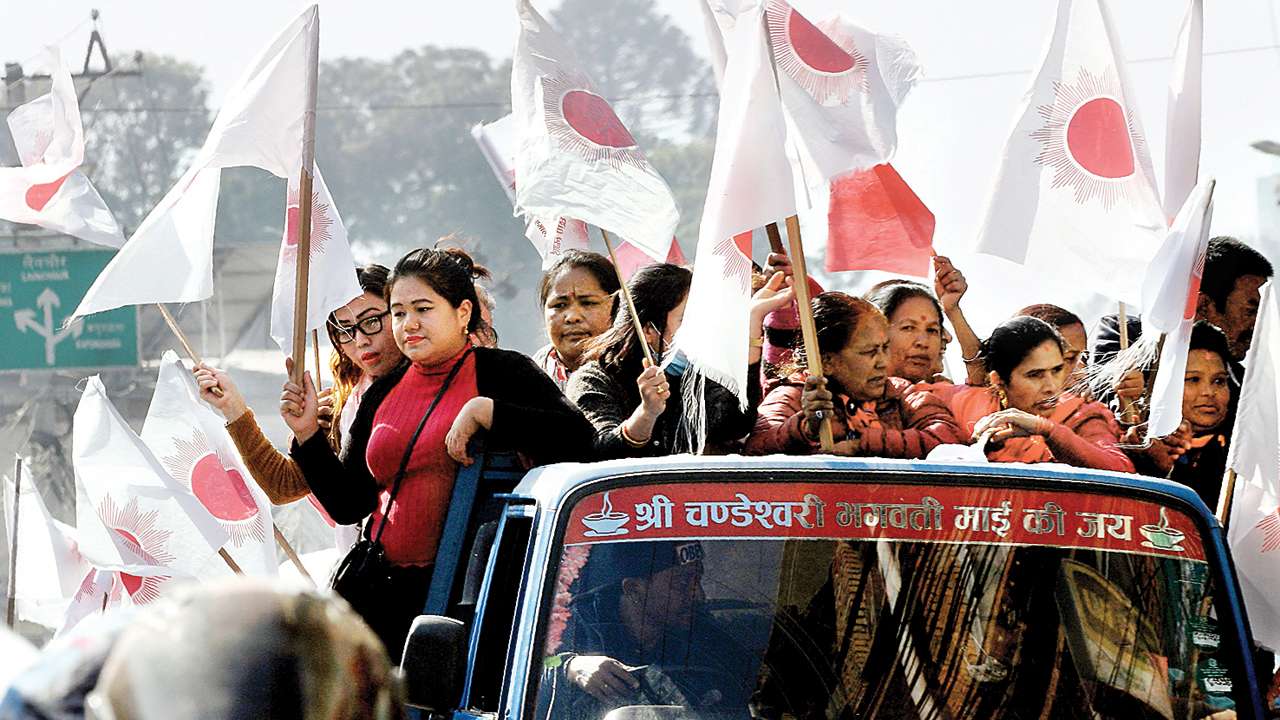
The landslide victory of the communist alliance in Nepal’s parliamentary elections marks the beginning of a new era in the Himalayan country. The Left Alliance — of the Communist Party of Nepal –Unified Marxist-Leninist (CPN-UML) and the Maoist Centre — swept 116 of the 165 seats to parliament. The long-dominant mainstream liberal democratic Nepali Congress (NC) managed a mere 23 seats, behind much smaller parties which together bagged 26.
There are 275 seats in this federal parliament elected under the secular, democratic and inclusive constitution which was promulgated in 2015 in spite of stiff opposition from India and Indian-origin Madhesis in the plains (Terai). Of the 275 members, 165 are directly elected and 110 chosen by proportional representation, which ensures seats for jan jatis (indigenous people), women and Dalits.
The Left Alliance (LA) also won six of the seven provincial assemblies under the new constitution. The LA was forged weeks before the elections, although the Maoists were part of the (outgoing) government led by NC leader Sher Bahadur Deuba. Now, the two communist parties are expected to merge.
Former prime minister and UML leader K P Oli, who had fallen foul of New Delhi — for his refusal to defer promulgation of the new constitution in 2015 — and whose government was replaced by the NC-Maoist alliance (at India’s behest), is the LA’s frontrunner for the post of prime minister. This is not good news for New Delhi.
However, in a broader sense, the LA’s victory is good news because the decisive mandate means political stability and the promise of economic development being placed at the centre of politics. Since it became a multiparty democracy in 1990, development and stability have eluded Nepal — one of the world’s poorest countries with a per capita GDP of $730.
The 29 million Nepalese, who suffered a succession of opportunistic coalitions of all and every ideological hue in the last 28 years, have been deprived of the benefits of both democracy and development. There have been 10 prime ministers in the last 11 years; and, more from 1990 to 2006, when India paved the way — with the 12-point agreement — for the Maoists to enter mainstream parliamentary politics. The Maoists under Prachanda had, from 1996, waged a 10-year-long “People’s War”, which had claimed nearly 17,000 lives.
The Maoists’ electoral plunge was rewarded handsomely in the constituent assembly elections of 2008. Prachanda’s party emerged as the largest and the guerilla leader became prime minister, though his term was short-lived as Kathmandu returned to its revolving-door politics. In 2013, Prachanda was defeated and the Maoists got only 26 seats — against the 120 they had won in 2008. However, the cycle of opportunistic coalitions again made him prime minister in 2016, when New Delhi supported his alliance with NC’s Deuba to keep UML’s Oli out of office.
The UML, which in recent years was overshadowed by the Maoists. is no longer the “lesser” communist party. It accounts for 80 of the LA’s 116 seats in parliament.
In retrospect, it appears that the ouster of Oli — because he earned New Delhi’s displeasure — did not go down well with the Nepalese; and, that they have not forgiven India for the six-month economic blockade in support of the Madhesis. Oli, who as prime minister braved the blockade — and described it in the UN as “an act of inhumanity worse than war” — has won a decisive vote for his policies. It is also a vote for Nepal’s assertion of its sovereignty.
However, the vote for Oli is not necessarily a vote against India. It is a vote against a particular — unpopular — policy line adopted by New Delhi, which drove Nepal under Oli to seek a stronger partnership with China. Both New Delhi and Kathmandu know that Nepal’s needs cannot be met by China in the way it is by India. Yet, if Oli embraced Beijing, it was to score a political point.
The point scored and purpose (of winning the election) served, it is expected that Oli as prime minister would be pragmatic; and, that Prachanda would act as a check in favour of India. The stability of a LA government depends on the leadership’s ‘realpolitik’. Given the compulsions of realpolitik, it may not be easy, practical or painless for Nepal to break out of India’s orbit and cast its lot with China, though China’s involvement and influence in Nepal are bound to get a boost in the present
circumstances.
This does not mean that the ‘Red Star’ over Nepal should serve as a red rag to New Delhi. Apart from Oli, top UML leader Madhav Kumar Nepal and Maoist chief Prachanda would be occupying key positions — one as president of the country and the other as head of the merged communist party. These two have a better relationship with influential sections in India, and that is expected to help revive the lost trust and warmth in bilateral ties.
Surprisingly, except for BJP General Secretary Ram Madhav congratulating Oli, the Indian establishment has been conspicuously silent on the stunning political turn in Nepal. Neither Modi Sarkar nor the Ministry of External Affairs (MEA) — which are acutely aware of Nepal’s sensitivities and how India offended these in recent years — has reacted to the LA’s victory even four days after the results.
More than that of any other country, it is India’s official reaction that matters greatly to Kathmandu’s elected elite, and would be watched in the region and world capitals. Hence, the sooner New Delhi comes up with a considered, and generous, reaction, indicating a desire to make amends and reset ties as part of a new approach to evolving policy, the better would it be for clearing the air between India and Nepal.
The author, an independent political and foreign affairs commentator, is co-editor of the book State of Nepal